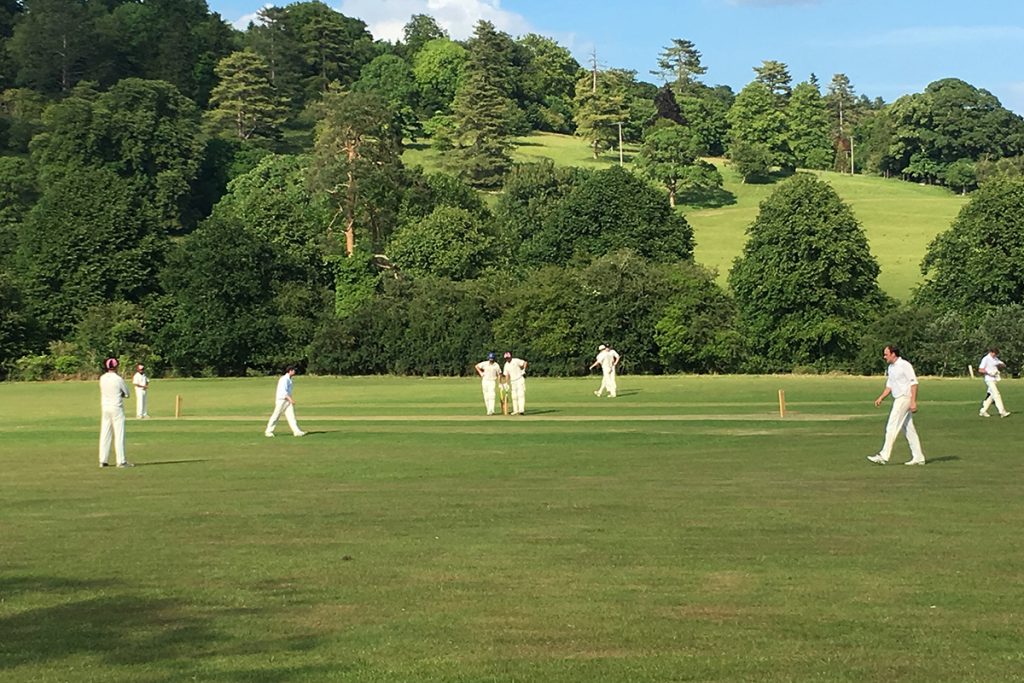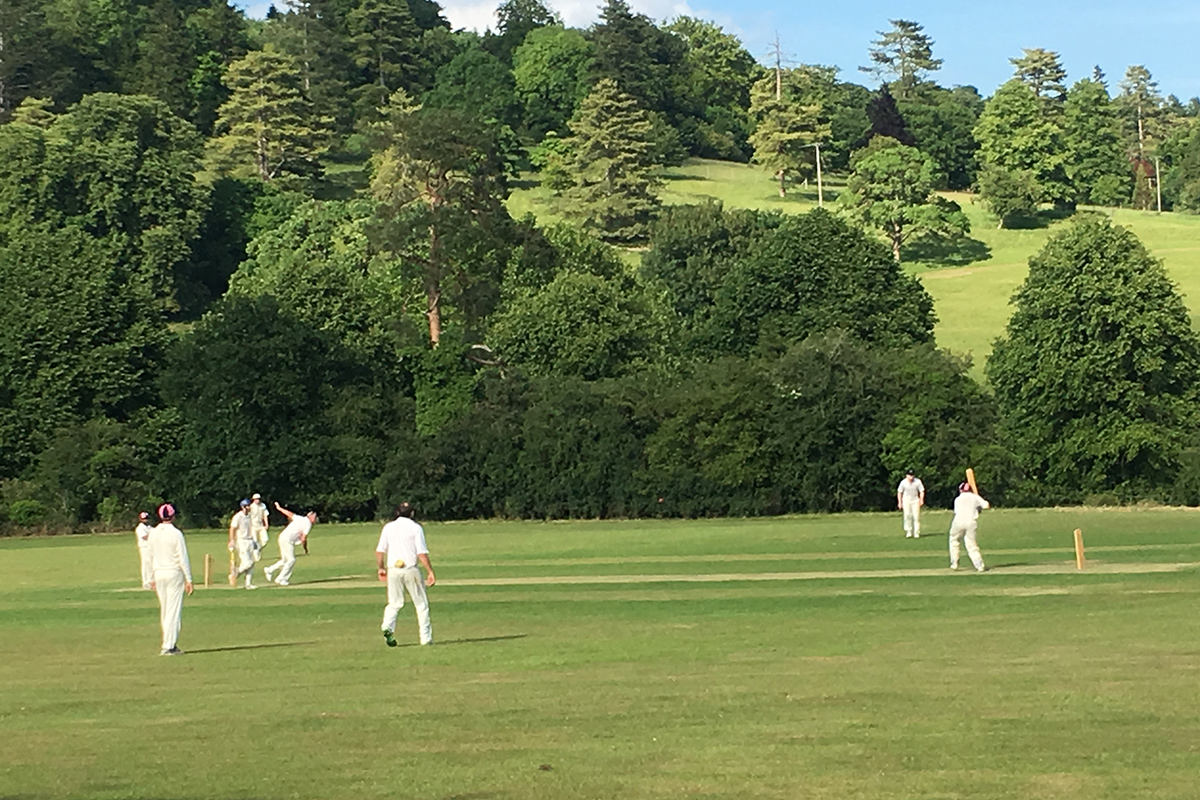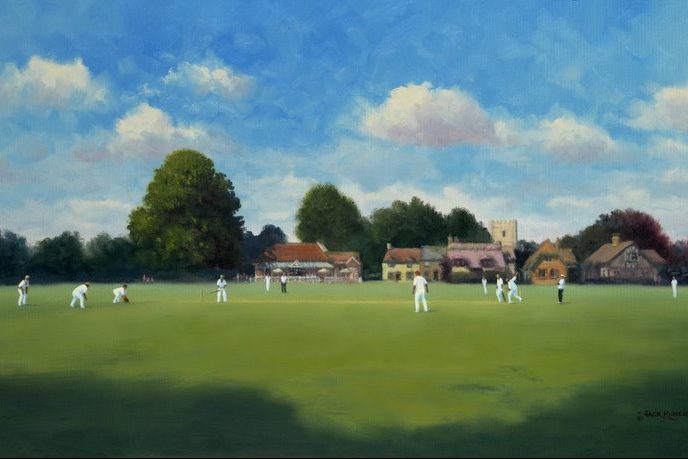V&A v The Bandits
V&A PLAYERS: Lachlan Nieboer (Captain), Jago Poynter, Ross Ashcroft, Rob Taylor, Christiaan Jonkers, Tom Ayling, Adam Jacot, Rupert Morris, Tom Bird, Nick Emley, Dennis de Caires
‘My name is Andrew Lang
Andrew Lang
That’s my name
And criticism and cricket is my game’ – Robert Louis Stevenson
Stevenson referred not to the genial captain of the Battersea Bandits, but to the nineteenth century, Scottish poet and antiquarian. I never enquired whether he was a direct relation but stalking out to bat, with his team at 73-5, chasing 180, he looked dour and determined as only a Scot could. With his brother Robbie, who had been at the wicket from the beginning of the innings, he set about rebuilding the innings. Carefully at first, but in time both batsmen played with fluency, knocking off about half the required runs and giving V&A captain, Lachlan Nieboer something of a headache. Lachlan’s answer was to ask Mounsey-Thear, who was bowling perfectly tidy seam-up, to change to slow, loopy full tosses. The result was a procession of boundaries and no small amount of head scratching from the V&A fielders. Then, remarkably, Lang, A. contrived to play round one and was bowled.
It proved a pivotal moment in the match, but it did not spell an end to the Bandits aspirations. Rob Taylor pulled off a spirited piece of fielding to run out Roberts in the following over, but undid his good work with an over of pies, conceding 13 runs and leaving just 26 required from six overs. The balance now decidedly in favour of the Bandits. Even a wicket maiden including the crucial wicket of Lang, R. for a gutsy, if fortuitous, 67 could not douse the Bandits’ sprits. With one over to go, the Bandits needed seven with the final pair in. It was the sort of situation to make Henty Newbolt go weak at the knees. One… dot… one… a defensive prod, a desperate single, an accurate throw and the sprawling Lucius was adjudged short of his mark. He implored the umpire to reconsider, requested a stewards’ enquiry, threatened to involve the Prime Minister and even the military, but to no avail. No one was listening, stumps were drawn and the V&A had won by four runs.
It had been a day of blistering weather and it was a sensible decision to play a forty over game. The first ball of the day from the medium-paced Lucius sprang off a length and struck poor Robbie Lang, keeping wicket, on the chest. It was just one of many idiosyncrasies from the pitch, its irregularity amplified by its hardness after a week of fine weather. Stonor is a beautiful ground: its aspect from the bench at the highest part of the boundary, across the deer park and down the valley, has been judged to be amongst the best of any cricket ground in the country, but the pitch itself is shite and getting worse. It was not long before Tom Ayling, who had hit his first ball for four and appeared to take up from where he left off last week, got in a tangle with one which stopped and gloved it to wicketkeeper. I was umpiring at the time and I was asked by a fielder if our number three, Rupert Morris, was a very good batsman. I said he was our Treasurer. He soon departed to a sharp catch in the gully, but it wasn’t long before Mounsey-Thear was doing what he does best in the summer: scoring runs. It was no time at all before he was bringing up another 50 with consecutive sixes and despite the pitch, the V&A were well placed at 110 for 2 at lunch. The lunch time discussion mainly involved a lively debate about the plural of referendum. I maintained than I had heard it on good authority that it was referendums as referendum was a gerund. Lachlan, a classical scholar, begged to differ and started to bang on about gerunds of obligation, peppered with some quick-fire declensions. As Nicky Bird likes to remind me, I really only did sums at school, so this sort of talk was way beyond my classical pay-scale. I said a definitive answer would be given in the match report*, adding that I was writing it. This is rather like the old story of the batsman, who complains to the umpire about a decision. “Look in the paper on Monday,” says the umpire, to which the batsman retorts, “You look. I’m the editor.”
Lachlan must have still been mulling over Latin verbs when he went out to bat shortly after lunch and was soon out, caught down the leg side without scoring. He was convinced he hadn’t hit it, but he is not the editor, so there was no reprieve either in the scorebook or in the match report.

The V&A’s innings then took a turn for the worse, its potent engine room of Ashcroft, Mounsey-Thear, Neiboer, de Caires and Taylor all falling in the space of five runs. We were reeling at 123-7. Recovery came in the form of Jago Poynter, aided first by Tom Bird, until someone unsportingly bowled him a straight one, and then by Nick Emley. There had been some consternation a couple of weeks ago that Emley had taken too much time scoring too few runs, which combined with the surfeit of batting riches at the V&A’s disposal meant he found himself coming in at 10, a position hitherto unfamiliar to him. A lesser man would have baulked at the prospect, gone off in a huff, or applied himself half-heartedly to the tricky situation in hand. But Emley is made of sterner stuff. He started by cutting his first delivery imperiously for four, followed by a serious of kamikaze tip and runs, with barely a dot ball between. Such was his energy that back in the pavilion, Nicky Bird began musing on what we should do if Emley had a heart attack and dropped down dead. The general consensus was that we should lift him to the boundary edge and continue the game to its conclusion before dealing with the cadaver in the proper way. Rupert was quick to point out that merely by entering the ground a player or spectator puts him outside the scope of the V&A’s insurance; not the case for the car just pulling out of Stonor Park, which narrowly missed a mighty six from the Poynter bat.
These late cameos, both ended by Saleem who was the pick of the Bandits’ bowlers, gave the V&A just enough, but credit must go to our opposition. The V&A’s side was virtually at maximum strength with depth in both batting and bowling and little prospect of wallyish fielding, so for the Bandits to run it as close as they did is testament to their talent and determination and made for a fantastic game.
The Golden Ball was holding a private party so we decamped to The Rainbow after the game, where the landlord, Curly was holding court. This used to be the regular after match pub until Nicky disgraced himself with the landlady and we were forced to seek pastures new. Whilst at the bar, I spied some Lower Assenden Marmalade and thinking it would make a welcome addition to the Jonkers breakfast table, sought to add it to my round. “You’ll have to pay for it separately,” barked Curly. Fine, but having given all my cash in match fees, I had only a credit card. “Well, you can forget about that then”, replied mein host, snatching the jar from me and returning it to its stack. Clearly the intervening years have done little to diminish Curly’s unique charm.
*The problem seems to stem from the fact that referendum is a comparatively modern word and did not enter the language before 1817 and was not in classical Latin at all. The Romans used the word plebescita for a vote of commoners (a much more appropriate phrase, given the bugger’s muddle that ensues from recent referendums). Anglophones developed the use of referendum, made up from the gerund of the Latin verb referre (to refer). However, in Latin a gerund has no plural, so using the word referenda in English is merely a Latinate bastardisation and nod to the word’s classical root. Thus the only logical course of action for a modern English word, is to apply modern English grammar, so the vulgar tongue has it.






